[XENEA Wallet] Daily Quiz April Answers and Trivia! ✨️ updated daily ✨️
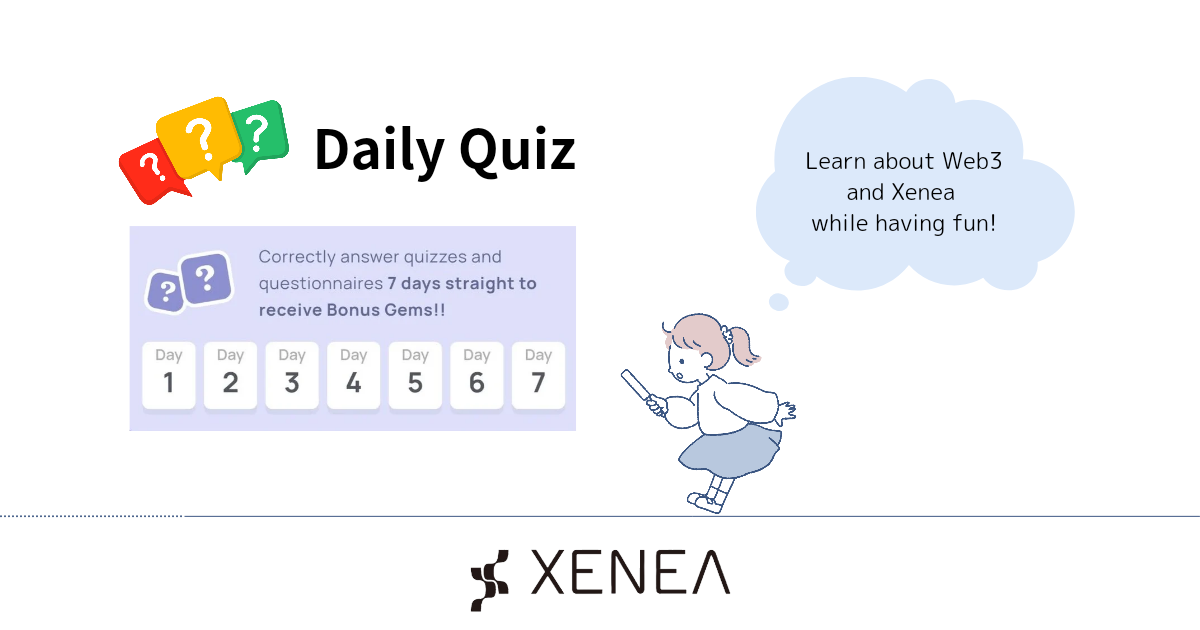
👉March Answers and Trivia
👉February Answers and Trivia
👉January Answers and Trivia
XENEA Wallet features a Daily Quiz that enhances user engagement while offering a fun and gamified way to learn about Web3 and the Xenea ecosystem.
Although many kind individuals are sharing answers on X (formerly Twitter), it feels like the quiz is turning into a game of simply picking the right answer without understanding the questions. To address this, this article will provide not only the answers to XENEA Wallet’s Daily Quiz but also the reasoning behind them and additional insights. By leveraging XENEA Wallet NAVI (ChatGPT), we aim to make the experience more informative and meaningful.
It takes less than a minute, so bookmark this page and check back daily! 😊
Start Your Journey with XENEA Wallet Today!
XENEA Wallet is an innovative app that makes exploring the world of Web3 both fun and rewarding! Complete simple missions, claim daily bonuses, and earn rewards while learning about the future of digital technology.
With cutting-edge security and unparalleled convenience, XENEA Wallet offers you the chance to participate in future airdrops and mining opportunities. Simply download the app to begin your new digital experience!
New users can start with 1,000 gems by signing up with the invite code below!
1️⃣ Download the app
2️⃣ Enter the invite code: h3dYzHejPI
3️⃣ Sign up with your Google or Apple account
Enjoy the exciting world of XENEA Wallet!
Please refer to the following page for information on how to earn Gems.
How many days does it take to earn 10,000 gems and start automatic mining with the XENEA Wallet?
Daily Quiz on APR 30
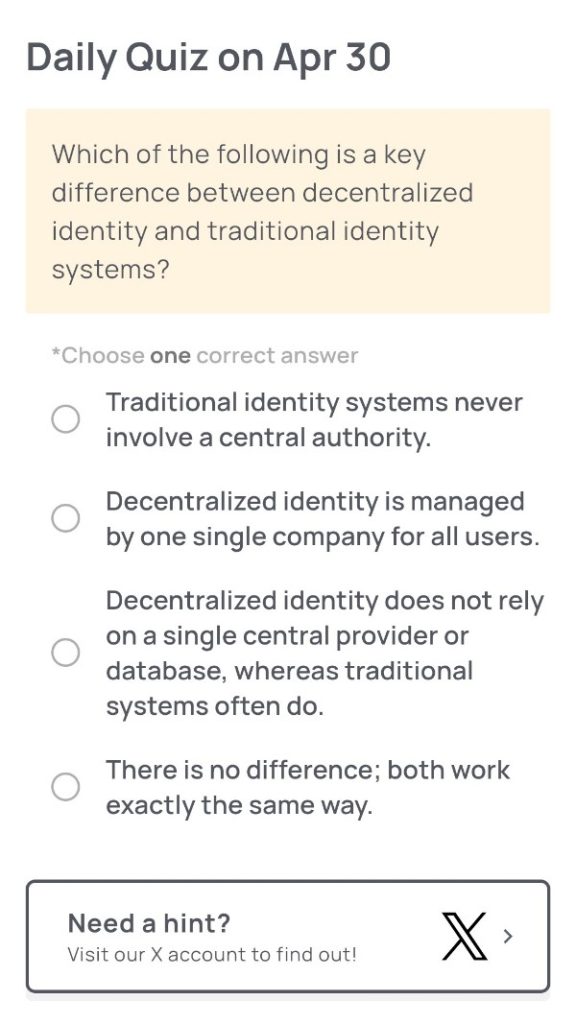
🟢Quiz Questions:
Which of the following is a key difference between decentralized identity and traditional identity systems?
🟢Choose one correct answer:
・Traditional identity systems never involve a central authority.
・Decentralized identity is managed by one single company for all users.
・Decentralized identity does not rely on a single central provider or database, whereas traditional systems often do.
・There is no difference; both work exactly the same way.
🟢Answer:
Decentralized identity does not rely on a single central provider or database, whereas traditional systems often do.
🟢Reason for choosing this answer:
Decentralized identity (DID) frameworks aim to give users control over their personal data and reduce reliance on centralized authorities or databases. Traditional identity systems typically require a central authority, like a government or large corporation, to store and verify identity data. This centralized model creates a single point of failure and risks around privacy and control. In contrast, decentralized identity distributes trust and data storage across multiple nodes, enhancing privacy, security, and user autonomy.
🟢Trivia:
Decentralized identifiers (DIDs) are often stored on blockchains, which allow for tamper-resistant and verifiable identities without exposing sensitive personal data. Projects like XSTAR (in partnership with Xenea) are working on scalable identity solutions using concepts like Proof of Humanity to confirm real users without centralized validation.
Daily Quiz on APR 29
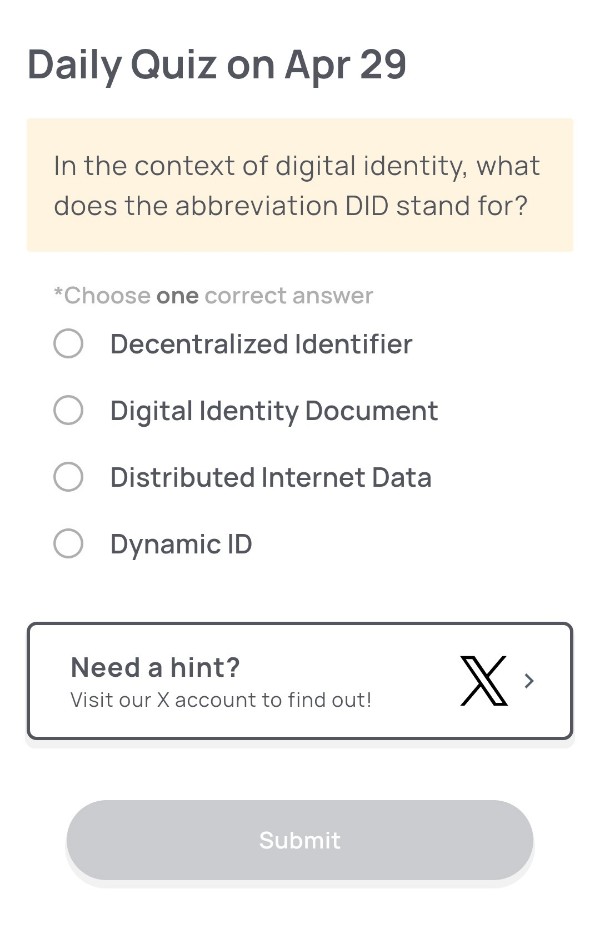
🟢Quiz Questions:
In the context of digital identity, what does the abbreviation DID stand for?
🟢Choose one correct answer:
・Decentralized Identifier
・Digital Identity Document
・Distributed Internet Data
・Dynamic ID
🟢Answer:
Decentralized Identifier
🟢Reason for choosing this answer:
In the context of digital identity, DID stands for Decentralized Identifier. A Decentralized Identifier is a new type of identifier that enables verifiable, self-sovereign digital identities. Unlike traditional identifiers like emails or usernames, which are often issued and controlled by centralized authorities, DIDs are created and managed on decentralized systems like blockchains, giving users full control over their own digital identity without relying on a central authority.
🟢Trivia:
DIDs are a key component of Web3 and decentralized identity ecosystems. They are used in various standards such as the W3C DID specification, which defines how DIDs work. A DID typically points to a DID document, which contains information such as public keys, authentication methods, and service endpoints, all crucial for establishing secure and verifiable connections between entities on decentralized networks.
Daily Quiz on APR 28

🟢Quiz Questions:
In which scenario would decentralized storage be particularly beneficial?
🟢Choose one correct answer:
・Streaming high-definition video content in real-time
・Hosting temporary files for quick sharing
・Storing sensitive documents resistant to censorship or tampering
・Backing up non-critical personal photos
🟢Answer:
Storing sensitive documents resistant to censorship or tampering
🟢Reason for choosing this answer:
Decentralized storage is particularly beneficial for storing sensitive documents resistant to censorship or tampering because it distributes data across multiple nodes, making it extremely difficult for any single entity to alter, censor, or delete information. Unlike centralized systems where a single server can be targeted or compromised, decentralized systems like DACS (Decentralized Autonomous Content Storage) on Xenea ensure data persistence, integrity, and resistance to censorship.
🟢Trivia:
Decentralized storage systems often use technologies like IPFS (InterPlanetary File System) and blockchain-based storage layers to achieve data redundancy and security. In Xenea’s case, their DACS system even includes features like Sustainable Generation Manager (SGM), which ensures that data is replicated to new nodes automatically before storage media fails. This guarantees that critical information can be preserved for decades or even centuries without loss!
Daily Quiz on APR 27
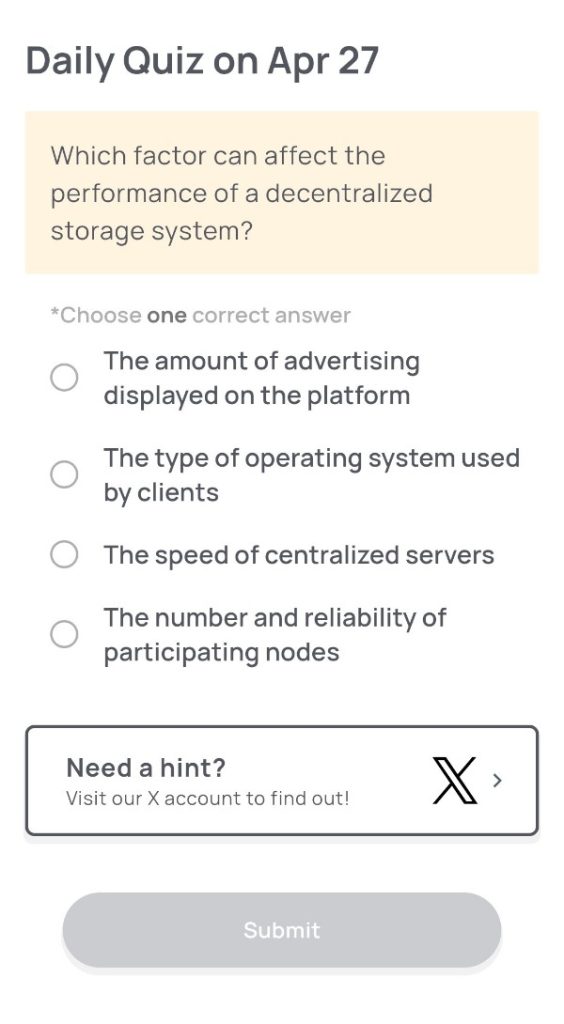
🟢Quiz Questions:
Which factor can affect the performance of a decentralized storage system?
🟢Choose one correct answer:
・The amount of advertising displayed on the platform
・The type of operating system used by clients
・The speed of centralized servers
・The number and reliability of participating nodes
🟢Answer:
The number and reliability of participating nodes
🟢Reason for choosing this answer:
In a decentralized storage system, data is distributed across multiple nodes rather than being stored on centralized servers. Therefore, the system’s overall performance heavily depends on how many nodes participate and how reliable those nodes are. If there are many reliable nodes, data can be stored and retrieved more efficiently and securely. Conversely, if nodes are few or unstable, it leads to slower access, data loss risks, and reduced overall reliability.
Advertising, client operating systems, or centralized server speeds have minimal direct impact because decentralized systems are intentionally designed to avoid single points of failure and client-specific dependencies.
🟢Trivia:
One popular decentralized storage technology is IPFS (InterPlanetary File System), which also relies on a network of nodes around the world. Xenea’s own decentralized storage system, called DACS (Decentralized Autonomous Content Storage), integrates mechanisms like Sustainable Generation Manager (SGM) to constantly monitor and replicate data across nodes to prevent data loss. This helps maintain high data availability even as individual nodes drop out over time.
Daily Quiz on APR 26
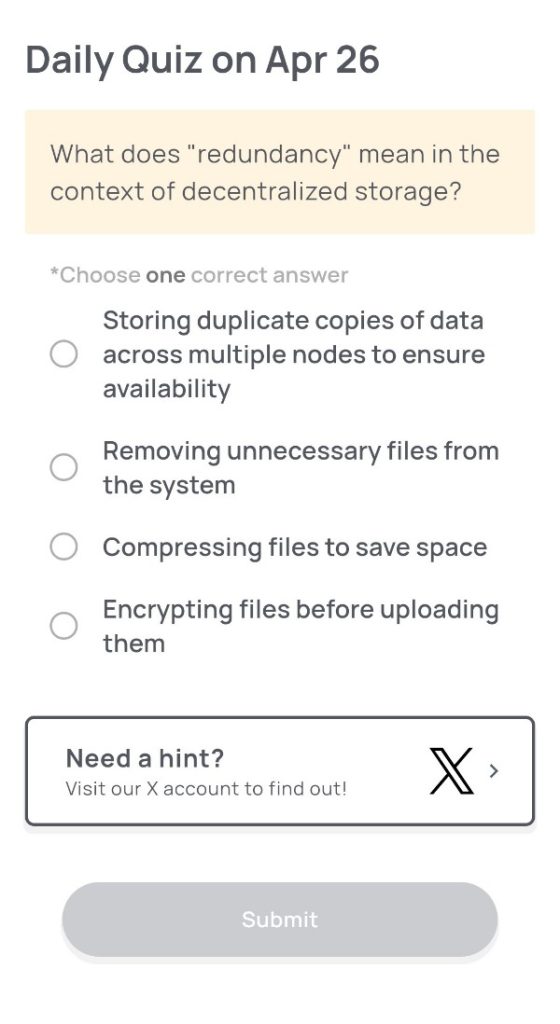
🟢Quiz Questions:
What does “redundancy” mean in the context of decentralized storage?
🟢Choose one correct answer:
・Storing duplicate copies of data across multiple nodes to ensure availability
・Removing unnecessary files from the system
・Compressing files to save space
・Encrypting files before uploading them
🟢Answer:
Storing duplicate copies of data across multiple nodes to ensure availability
🟢Reason for choosing this answer:
In decentralized storage systems like Xenea’s DACS, “redundancy” refers to storing duplicate copies of the same data across multiple nodes. This ensures that even if one or several nodes fail, the data remains accessible and intact. Redundancy is crucial for maintaining high availability, data persistence, and resilience against node failures.
🟢Trivia:
In Xenea’s DACS architecture, redundancy is actively managed by a system called “Sustainable Generation Manager (SGM),” which monitors the status of stored data and automatically replicates it to new nodes before storage devices expire. This system helps guarantee long-term data preservation without manual intervention!
Daily Quiz on APR 25
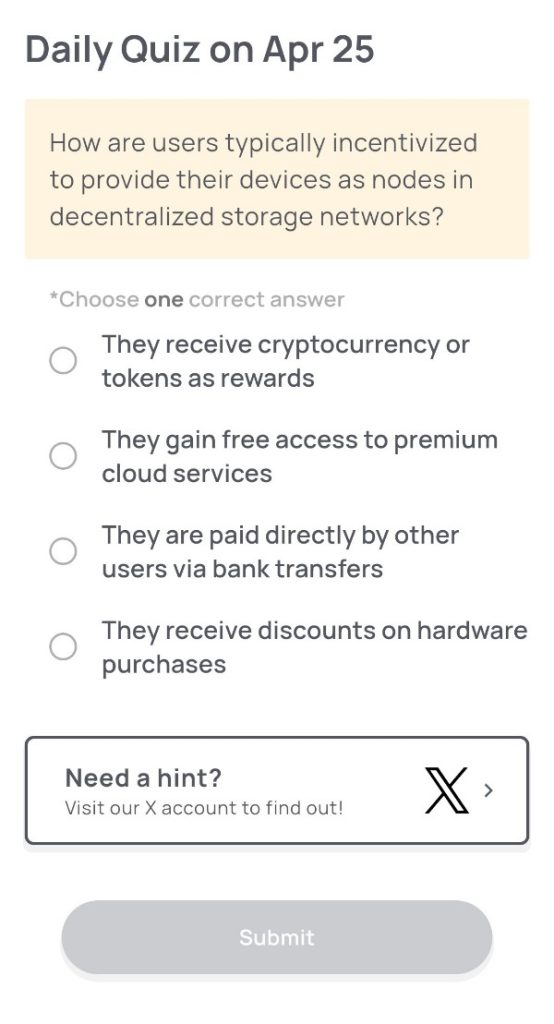
🟢Quiz Questions:
How are users typically incentivized to provide their devices as nodes in decentralized storage networks?
🟢Choose one correct answer:
・They receive cryptocurrency or tokens as rewards
・They gain free access to premium cloud services
・They are paid directly by other users via bank transfers
・They receive discounts on hardware purchases
🟢Answer:
They receive cryptocurrency or tokens as rewards
🟢Reason for choosing this answer:
In decentralized storage networks like Xenea’s DACS (Decentralized Autonomous Content Storage), node operators—who offer their devices and storage resources—are typically incentivized with tokens. For instance, Xenea uses its native token XENE to reward DACS nodes for storing data securely and reliably. These tokens serve as financial motivation and also help sustain the network by encouraging user participation and ensuring long-term data availability.
🟢Trivia:
In the Xenea ecosystem, DACS nodes receive 80% of the total block rewards, showcasing the importance of storage in decentralized architecture. This reward structure contrasts with traditional centralized storage providers, where users typically pay for storage. By leveraging token incentives, decentralized systems can achieve greater resilience and participation without relying on centralized control.
Daily Quiz on APR 24
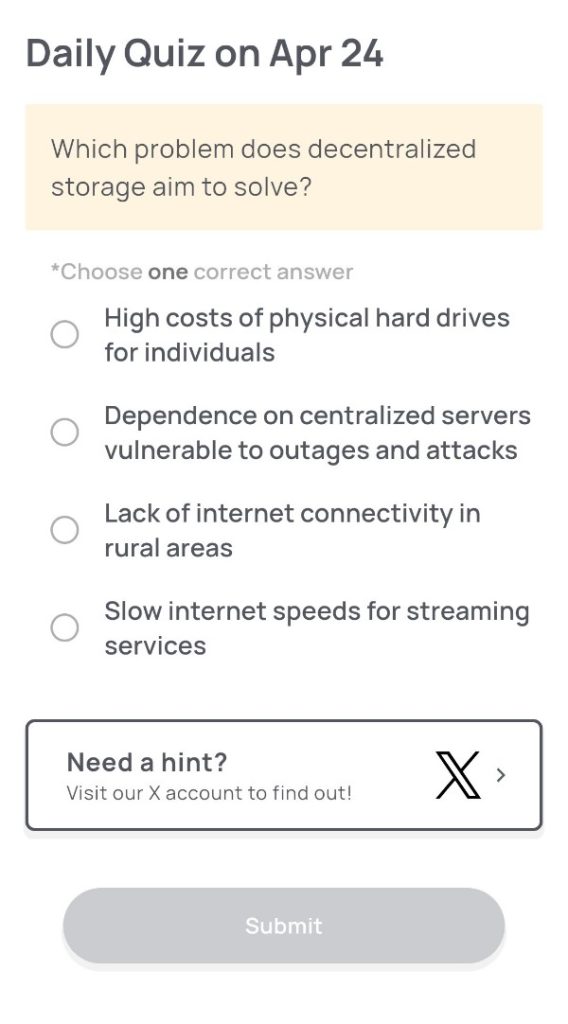
🟢Quiz Questions:
Which problem does decentralized storage aim to solve?
🟢Choose one correct answer:
・High costs of physical hard drives for individuals
・Dependence on centralized servers vulnerable to outages and attacks
・Lack of internet connectivity in rural areas
・Slow internet speeds for streaming services
🟢Answer:
Dependence on centralized servers vulnerable to outages and attacks
🟢Reason for choosing this answer:
Decentralized storage, like the DACS (Decentralized Autonomous Content Storage) used in the Xenea blockchain, is designed to counteract the vulnerabilities of centralized systems. Traditional storage relies on central servers, which pose a single point of failure—making them susceptible to attacks, data loss, or downtime. Decentralized storage distributes data across many nodes, ensuring higher security, availability, and resistance to censorship or server failures.
🟢Trivia:
Xenea’s DACS integrates IPFS (InterPlanetary File System) and utilizes a system called Sustainable Generation Manager (SGM) to extend data lifespan by replicating it across multiple nodes. This ensures that even as physical storage degrades over time, the data remains persistent and accessible on the blockchain network.
Daily Quiz on APR 23
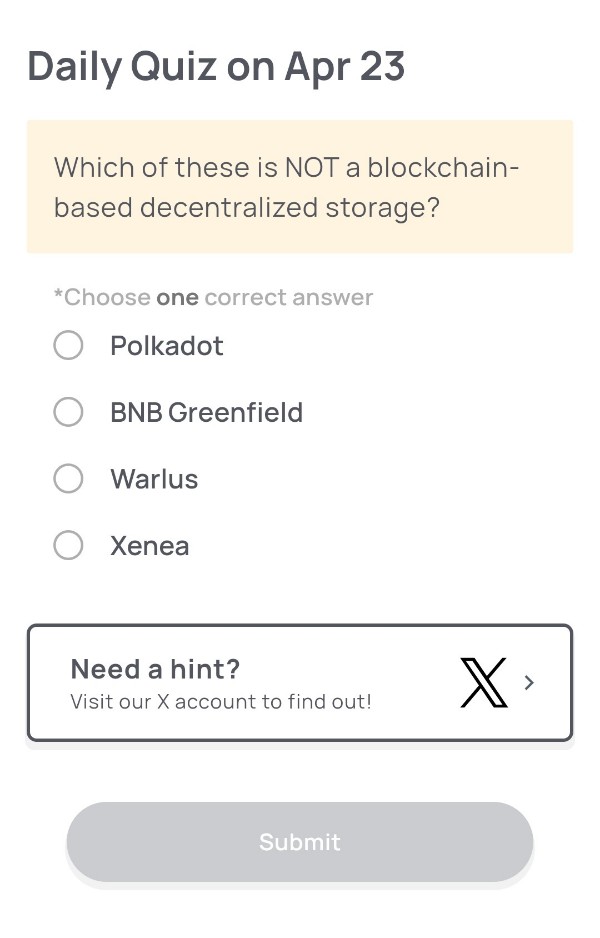
🟢Quiz Questions:
Which of these is NOT a blockchain-based decentralized storage?
🟢Choose one correct answer:
・Polkadot
・BNB Greenfield
・Warlus
・Xenea
🟢Answer:
Polkadot
🟢Reason for choosing this answer:
Polkadot is a multi-chain Layer 0 protocol designed to connect various blockchains and facilitate interoperability. It is not primarily a decentralized storage solution. While it supports parachains that may implement storage features, Polkadot itself does not function as a blockchain-based decentralized storage system.
In contrast, BNB Greenfield is Binance’s decentralized storage network, Warlus is a decentralized storage platform, and Xenea integrates Decentralized Autonomous Content Storage (DACS) as a core feature.
🟢Trivia:
Xenea’s DACS (Decentralized Autonomous Content Storage) uses technologies like IPFS and SGM (Sustainable Generation Manager) to ensure long-term data persistence by automatically replicating data across nodes before the original expires. This system is designed to securely store data directly on-chain, setting Xenea apart from traditional blockchains that rely on off-chain data solutions.
Daily Quiz on APR 22
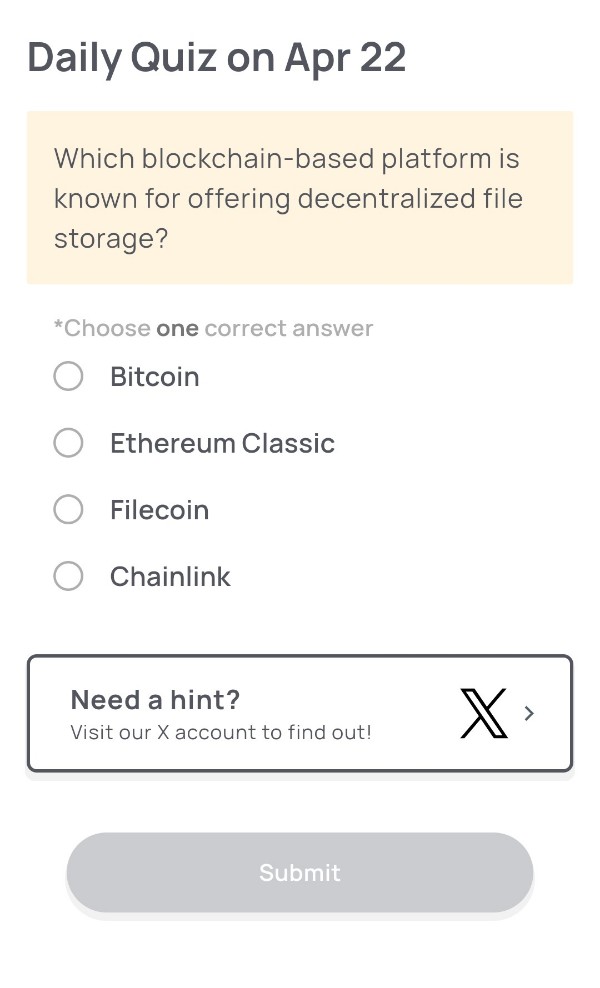
🟢Quiz Questions:
Which blockchain-based platform is known for offering decentralized file storage?
🟢Choose one correct answer:
・Bitcoin
・Ethereum Classic
・Filecoin
・Chainlink
🟢Answer:
Filecoin
🟢 Reason for choosing this answer:
Filecoin is a blockchain-based platform specifically designed for decentralized file storage. Unlike Bitcoin or Ethereum Classic, which are primarily used for transferring and managing cryptocurrencies or executing smart contracts, Filecoin was created to allow users to rent out their unused hard drive space or store data in a decentralized manner. Chainlink, while also a powerful blockchain protocol, focuses on decentralized oracle services, not storage.
🟢 Trivia:
While Filecoin is widely known for decentralized file storage using IPFS, Xenea offers an innovative approach with its native DACS (Decentralized Autonomous Content Storage) system. Unlike many blockchain projects that rely on external storage, Xenea integrates on-chain storage directly into its Layer 1 protocol. DACS ensures data persistence through mechanisms like Sustainable Generation Manager (SGM), which continuously replicates data across nodes to prevent data loss.
Xenea’s decentralized storage is particularly designed to support real-world asset (RWA) tokenization and long-term data integrity, making it a cutting-edge alternative to traditional decentralized storage platforms like Filecoin. Moreover, DACS will initially support IPFS, bridging the gap between existing decentralized storage technologies and Xenea’s advanced infrastructure.
Daily Quiz on APR 21
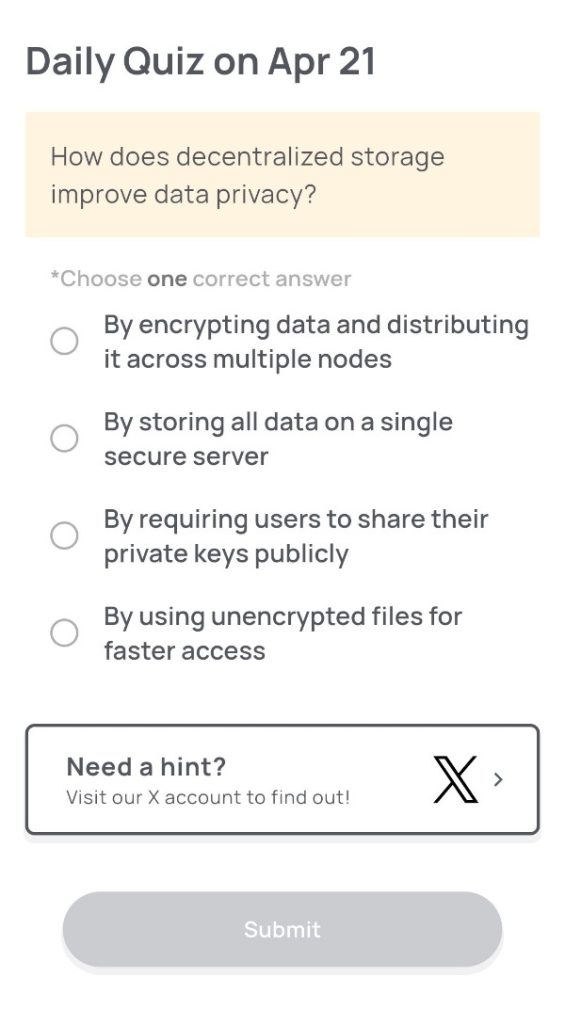
🟢Quiz Questions:
How does decentralized storage improve data privacy?
🟢Choose one correct answer:
・By encrypting data and distributing it across multiple nodes
・By storing all data on a single secure server
・By requiring users to share their private keys publicly
・By using unencrypted files for faster access
🟢Answer:
By encrypting data and distributing it across multiple nodes
🟢Reason for choosing this answer:
Decentralized storage enhances privacy by breaking down data, encrypting it, and then distributing it across many different storage nodes on a network. This method eliminates a single point of failure and makes it significantly harder for any attacker to access or alter the data without authorization. Unlike centralized systems, there is no central server to breach, and the data is often replicated with mechanisms like DACS (Decentralized Autonomous Content Storage) to ensure persistence and security.
🟢Trivia:
Xenea’s DACS (Decentralized Autonomous Content Storage) technology includes features like Sustainable Generation Manager (SGM), which ensures that data isn’t lost by replicating and rotating storage nodes. It also uses encrypted file systems and plans to integrate additional systems beyond IPFS. This technology not only improves privacy but also ensures data integrity and availability over time.
Daily Quiz on APR 20
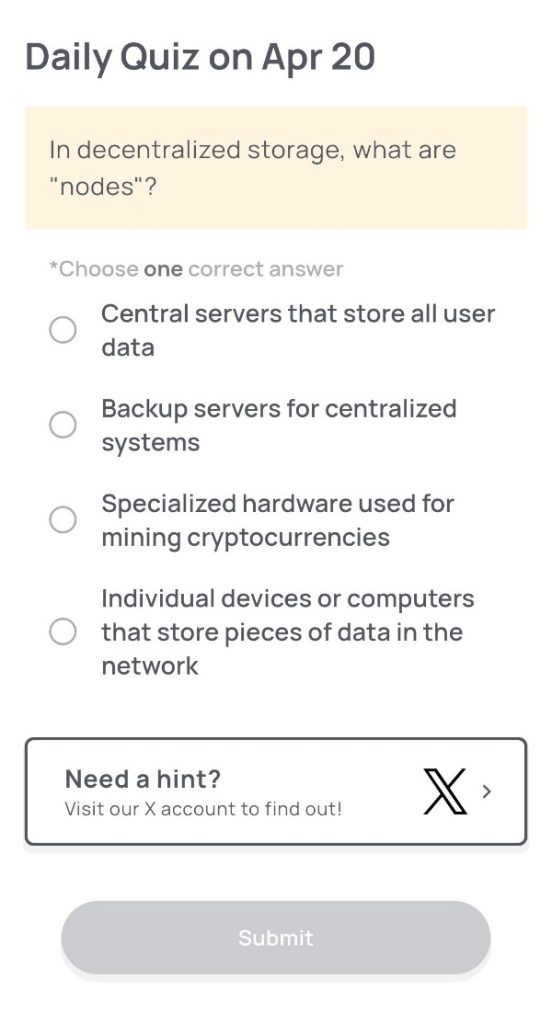
🟢Quiz Questions:
In decentralized storage, what are “nodes”?
🟢Choose one correct answer:
・Central servers that store all user data
・Backup servers for centralized systems
・Specialized hardware used for mining cryptocurrencies
・Individual devices or computers that store pieces of data in the network
🟢Answer:
Individual devices or computers that store pieces of data in the network
🟢Reason for choosing this answer:
In decentralized storage systems like Xenea’s DACS (Decentralized Autonomous Content Storage), nodes are individual devices or computers that participate in the network by storing data. Unlike centralized servers, each node only stores part of the overall data, and they work together to ensure data redundancy, persistence, and security. This decentralized approach eliminates single points of failure and enhances the system’s robustness and reliability.
🟢Trivia:
Xenea’s DACS system uses a mechanism called Sustainable Generation Manager (SGM) to ensure data doesn’t get lost. It periodically replicates data across different nodes based on time and network distance, maintaining long-term storage reliability. This is part of why decentralized storage is considered a future-proof method for managing critical information.
Daily Quiz on APR 19
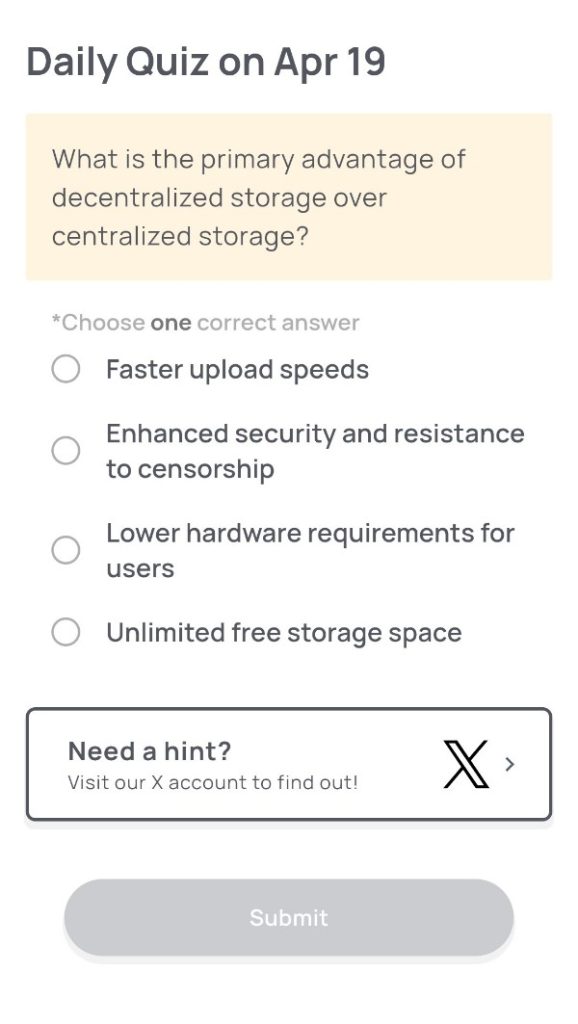
🟢Quiz Questions:
What is the primary advantage of decentralized storage over centralized storage?
🟢Choose one correct answer:
・Faster upload speeds
・Enhanced security and resistance to censorship
・Lower hardware requirements for users
・Unlimited free storage space
🟢Answer:
Enhanced security and resistance to censorship
🟢Reason for choosing this answer:
Decentralized storage systems distribute data across multiple nodes in a network, making it much more resilient to censorship, tampering, and single points of failure. Unlike centralized systems where one entity controls access and data integrity, decentralized models rely on consensus and encryption to protect user data. This significantly enhances both the security and the censorship-resistance of the data being stored.
🟢Trivia:
Xenea integrates a decentralized storage system known as DACS (Decentralized Autonomous Content Storage). This system ensures data persistence by using technologies like IPFS and a Sustainable Generation Manager (SGM), which automatically replicates data across the network to prevent loss and degradation.
Daily Quiz on APR 18
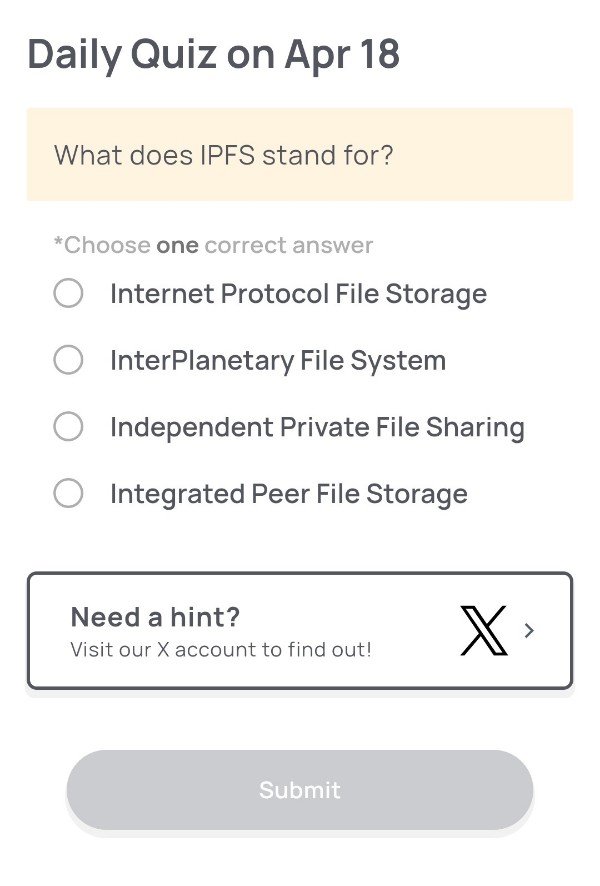
🟢Quiz Questions:
What does IPFS stand for?
🟢Choose one correct answer:
・Internet Protocol File Storage
・InterPlanetary File System
・Independent Private File Sharing
・Integrated Peer File Storage
🟢Answer:
InterPlanetary File System
🟢Reason for choosing this answer:
The correct answer is “InterPlanetary File System.” IPFS is a distributed file system designed to make the web faster, safer, and more open. It enables users to host and access files in a decentralized way, eliminating the need for a centralized server.
🟢Trivia:
IPFS is especially useful in blockchain and Web3 ecosystems because it ensures that data remains accessible and verifiable even if the original source is offline. For example, Xenea’s Decentralized Autonomous Content Storage (DACS) integrates IPFS to ensure data persistence and consistency across its blockchain network.
Daily Quiz on APR 17
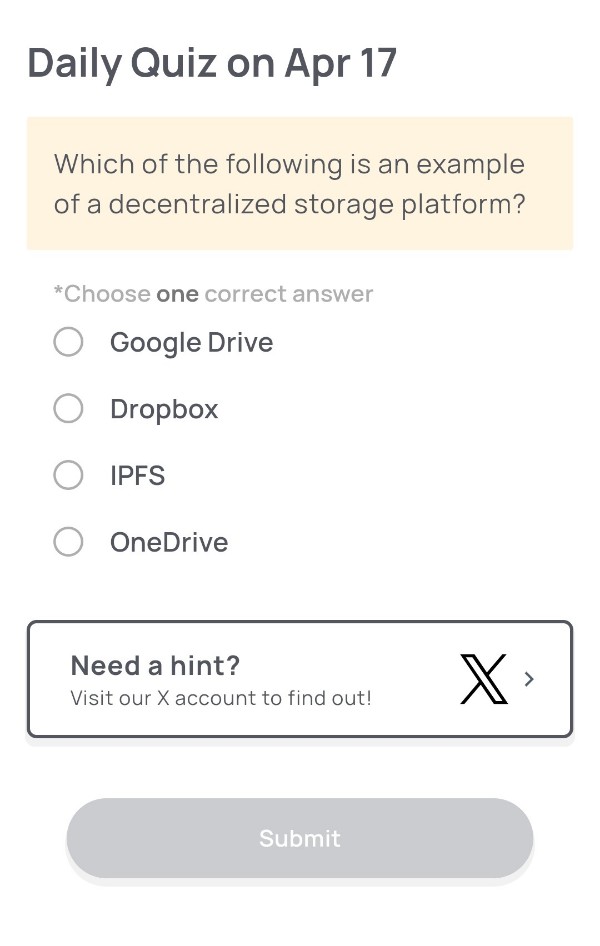
🟢Quiz Questions:
Which of the following is an example of a decentralized storage platform?
🟢Choose one correct answer:
・Google Drive
・Dropbox
・IPFS
・OneDrive
🟢Answer:
IPFS
🟢Reason for choosing this answer:
IPFS (InterPlanetary File System) is a decentralized storage protocol that allows files to be stored and shared across a distributed network of nodes, without relying on a central server. This contrasts with Google Drive, Dropbox, and OneDrive, which are centralized storage platforms managed by single companies. Decentralization in IPFS ensures that data remains accessible and tamper-resistant even if individual nodes go offline.
🟢Trivia:
IPFS is often integrated into blockchain-based systems like Xenea’s DACS (Decentralized Autonomous Content Storage), which supports IPFS for secure and persistent data storage on-chain. By using IPFS, blockchain projects can store NFT metadata and other large files in a trustless and verifiable way.
Daily Quiz on APR 16
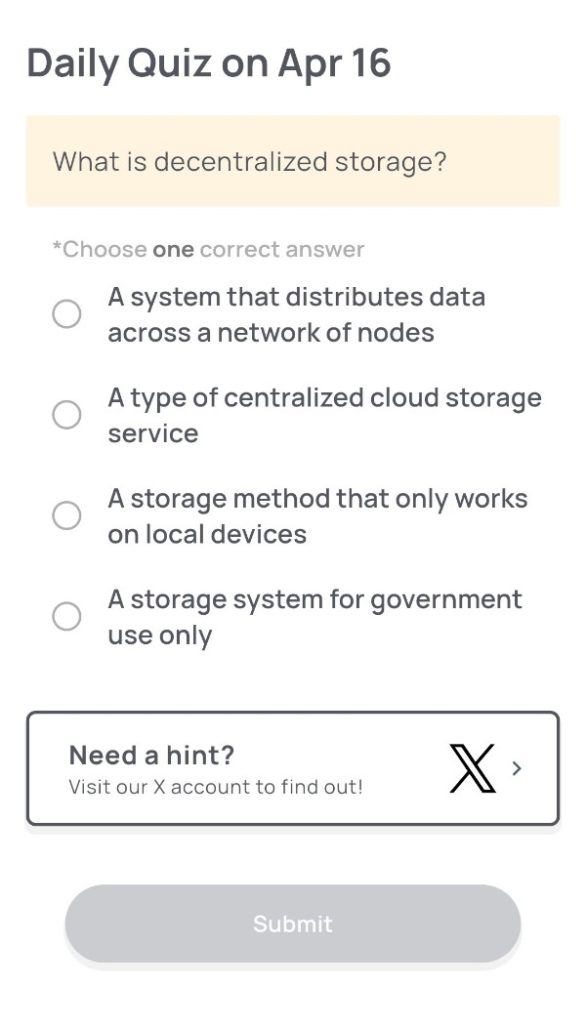
🟢Quiz Questions:
What is decentralized storage?
🟢Choose one correct answer:
・A system that distributes data across a network of nodes
・A type of centralized cloud storage service
・A storage method that only works on local devices
・A storage system for government use only
🟢Answer:
A system that distributes data across a network of nodes
🟢Reason for choosing this answer:
Decentralized storage distributes data across multiple nodes in a network instead of relying on a central server. This architecture enhances security, reduces the risk of data loss, and ensures better resistance to censorship or single points of failure. It aligns with blockchain principles of decentralization, where control and data aren’t in the hands of a single entity.
🟢Trivia:
Xenea integrates a unique decentralized storage solution called DACS (Decentralized Autonomous Content Storage), which stores data across blockchain nodes using technologies like IPFS. It also includes mechanisms like the Sustainable Generation Manager (SGM) to replicate data periodically and prevent loss due to physical storage limitations.
Daily Quiz on APR 15
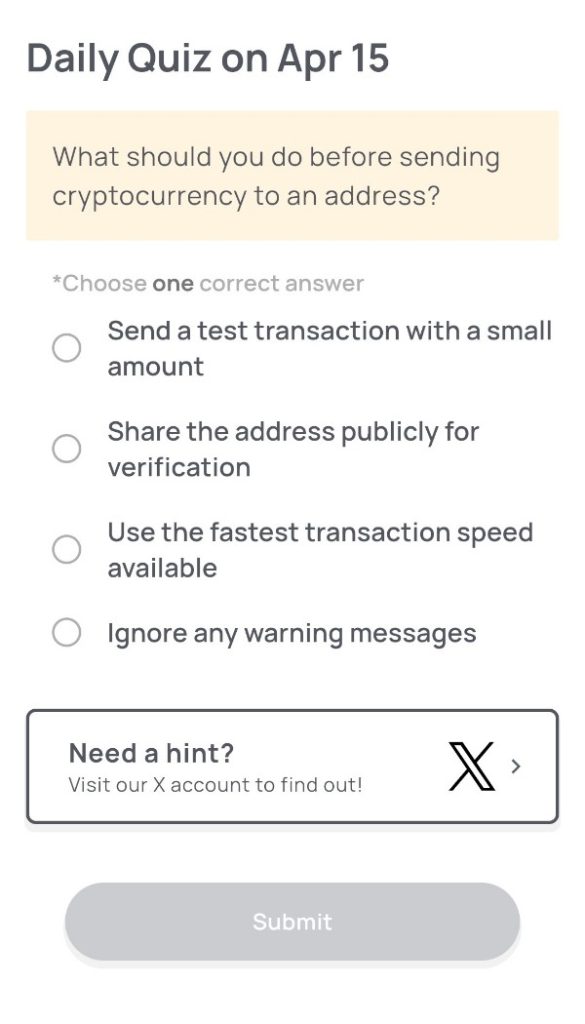
🟢Quiz Question:
What should you do before sending cryptocurrency to an address?
🟢Choose one correct answer:
・Send a test transaction with a small amount
・Share the address publicly for verification
・Use the fastest transaction speed available
・Ignore any warning messages
🟢Answer:
Send a test transaction with a small amount
🟢Reason for choosing this answer:
Sending a small test transaction before transferring a large amount of cryptocurrency helps confirm that the address is correct and that the funds will reach the intended recipient safely. It minimizes the risk of losing assets due to typos, phishing, or other errors.
🟢Trivia:
Many seasoned crypto users adopt this practice, especially when interacting with new wallets, exchanges, or manually copied addresses. Blockchain transactions are irreversible, so even a minor mistake can result in a permanent loss of funds. Always double-check the address and start small.
Daily Quiz on APR 14
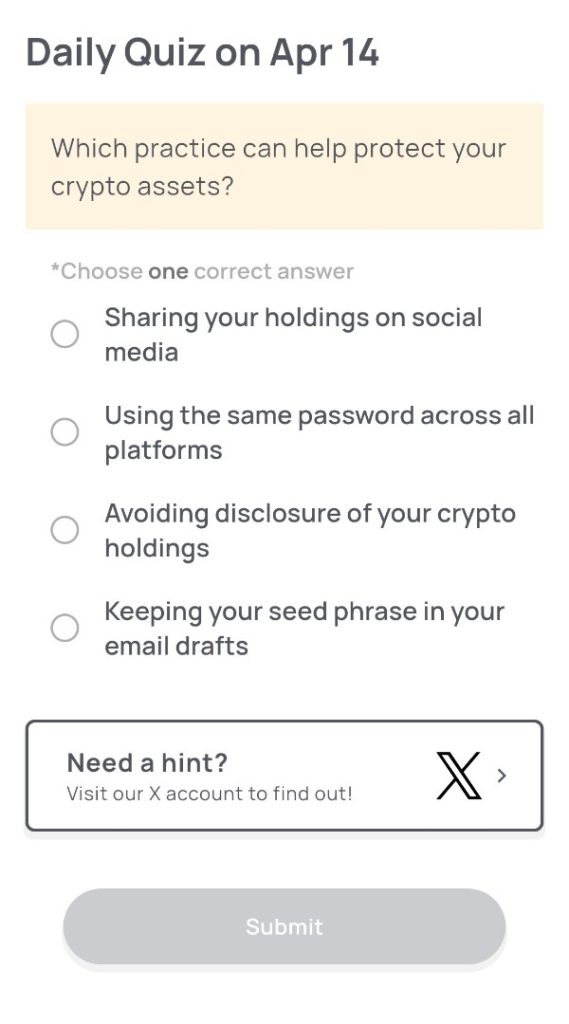
🟢Quiz Questions:
Which practice can help protect your crypto assets?
🟢Choose one correct answer:
・Sharing your holdings on social media
・Using the same password across all platforms
・Avoiding disclosure of your crypto holdings
・Keeping your seed phrase in your email drafts
🟢Answer:
Avoiding disclosure of your crypto holdings
🟢Reason for choosing this answer:
Avoiding disclosure of your crypto holdings helps protect your privacy and reduces the risk of becoming a target for phishing, hacking, or physical theft. Publicly sharing your crypto activity can attract unwanted attention from malicious actors who may attempt to exploit vulnerabilities to access your funds.
🟢Trivia:
A common method used by attackers is social engineering, where they gather information from public sources (like social media) to impersonate or deceive users into giving up sensitive details. This is why crypto security experts always recommend staying discreet about your crypto wealth.
Daily Quiz on APR 13
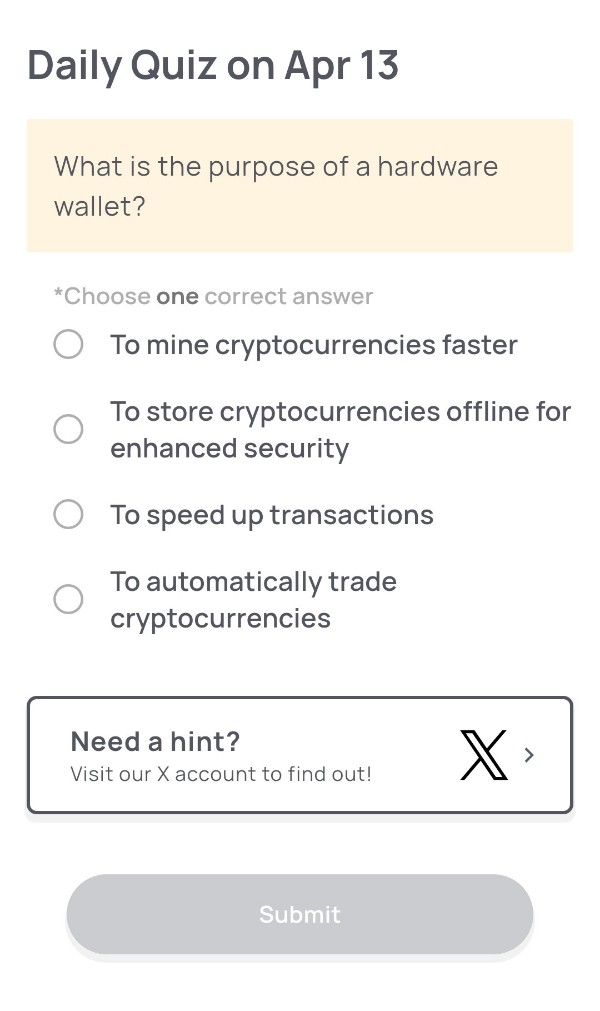
🟢Quiz Questions:
What is the purpose of a hardware wallet?
🟢Choose one correct answer:
・To mine cryptocurrencies faster
・To store cryptocurrencies offline for enhanced security
・To speed up transactions
・To automatically trade cryptocurrencies
🟢Answer:
To store cryptocurrencies offline for enhanced security
🟢Reason for choosing this answer:
A hardware wallet is a physical device used to securely store the private keys of your cryptocurrency wallets offline. By keeping your keys offline, it greatly reduces the risk of theft from hacks, malware, or phishing attempts, making it one of the safest methods to store crypto assets. It is not used for mining, trading, or speeding up transactions.
🟢Trivia:
Most hardware wallets (like Ledger or Trezor) are immune to computer viruses and are often used to store long-term holdings. They use secure elements and sometimes require a PIN and physical confirmation for each transaction, adding layers of protection for the user.
Daily Quiz on APR 12
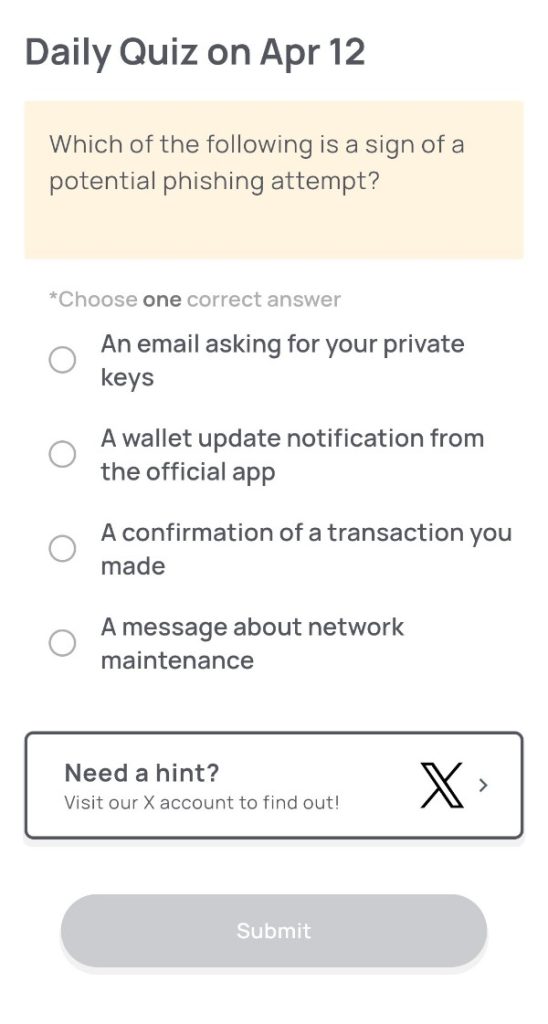
🟢Quiz Questions:
Which of the following is a sign of a potential phishing attempt?
🟢Choose one correct answer:
・An email asking for your private keys
・A wallet update notification from the official app
・A confirmation of a transaction you made
・A message about network maintenance
🟢Answer:
An email asking for your private keys
🟢Reason for choosing this answer:
Phishing attempts often aim to deceive users into revealing sensitive information like passwords or private keys. An email requesting your private keys is a classic red flag because no legitimate platform or wallet service will ever ask for them. This is a clear sign of a phishing scam.
🟢Trivia:
Your private key is the most important piece of information that proves ownership of your crypto assets. If someone gets access to your private key, they can take full control of your funds. That’s why secure wallets like Xenea Wallet use patented technology to split and store private keys across multiple nodes, eliminating the risk of them being exposed or stolen.
Daily Quiz on APR 11
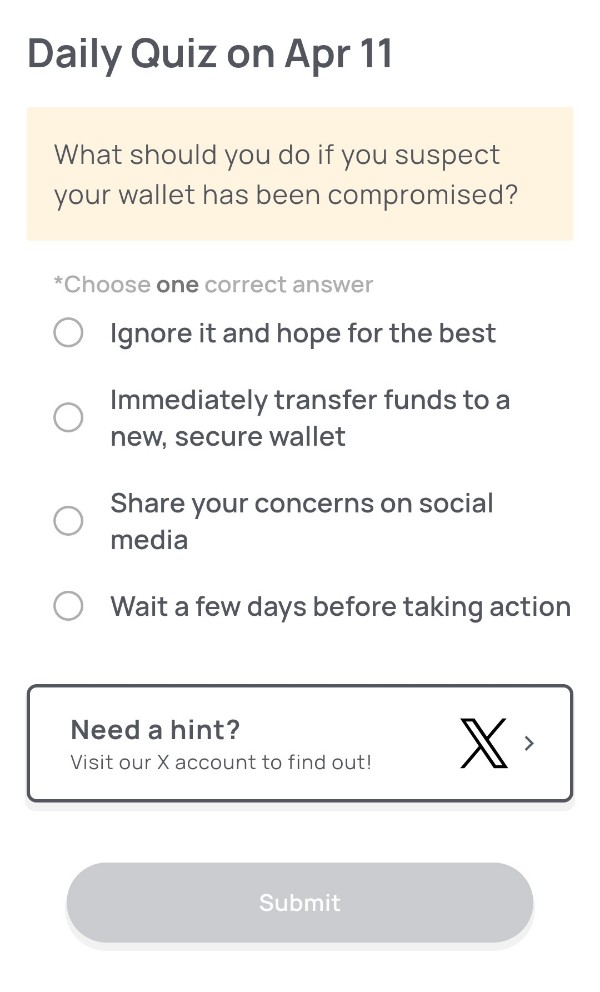
🟢Quiz Questions:
What should you do if you suspect your wallet has been compromised?
🟢Choose one correct answer:
・Ignore it and hope for the best
・Immediately transfer funds to a new, secure wallet
・Share your concerns on social media
・Wait a few days before taking action
🟢Answer:
Immediately transfer funds to a new, secure wallet
🟢Reason for choosing this answer:
If you suspect that your wallet has been compromised, time is critical. Immediately transferring your assets to a secure wallet reduces the risk of losing your funds to malicious actors. Delaying action can give attackers time to access your assets, while ignoring the issue or broadcasting it publicly without taking proper steps may increase the risk.
🟢Trivia:
Modern wallets like Xenea Wallet integrate patented technology such as Electronic Allocation Type Storage, which splits and stores private keys across anonymous nodes to minimize the risk of key exposure. This means even if one node is compromised, it’s nearly impossible for attackers to reconstruct the full private key. However, user vigilance is still essential—acting quickly remains the best defense against potential breaches.
Daily Quiz on APR 10
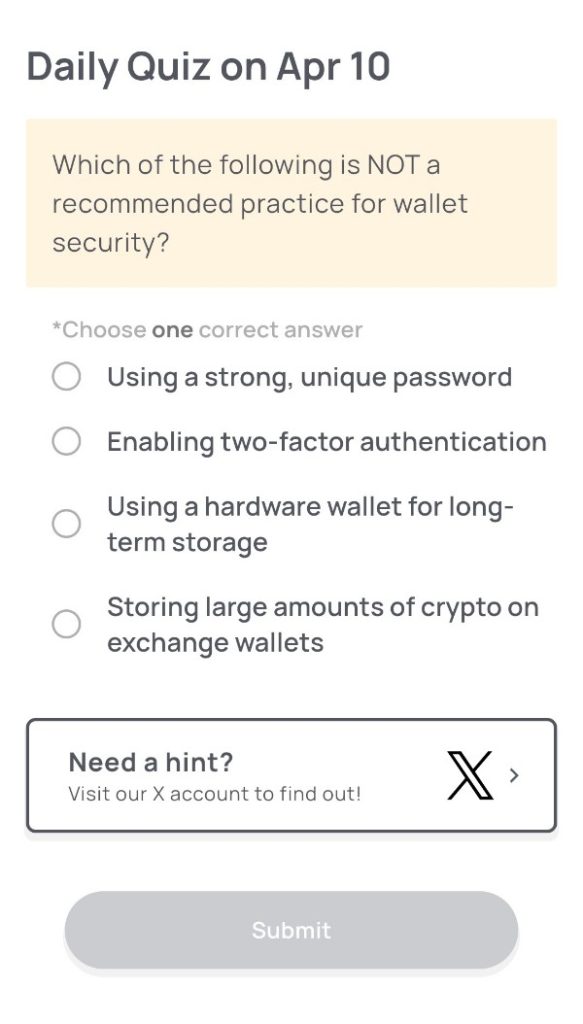
🟢Quiz Questions:
Which of the following is NOT a recommended practice for wallet security?
🟢Choose one correct answer:
・Using a strong, unique password
・Enabling two-factor authentication
・Using a hardware wallet for long-term storage
・Storing large amounts of crypto on exchange wallets
🟢Answer:
Storing large amounts of crypto on exchange wallets
🟢Reason for choosing this answer:
Exchange wallets are considered less secure because the private keys are managed by the exchange rather than the user. This creates a single point of failure—if the exchange is hacked or shuts down, users may lose access to their funds. Best practices recommend using personal wallets, especially hardware wallets, for storing significant amounts of crypto securely.
🟢Trivia:
One of the most famous cases highlighting the risks of exchange wallets is the Mt. Gox incident. In 2014, the exchange filed for bankruptcy after 850,000 BTC were allegedly stolen, underscoring the importance of self-custody in crypto asset management.
Daily Quiz on APR 09
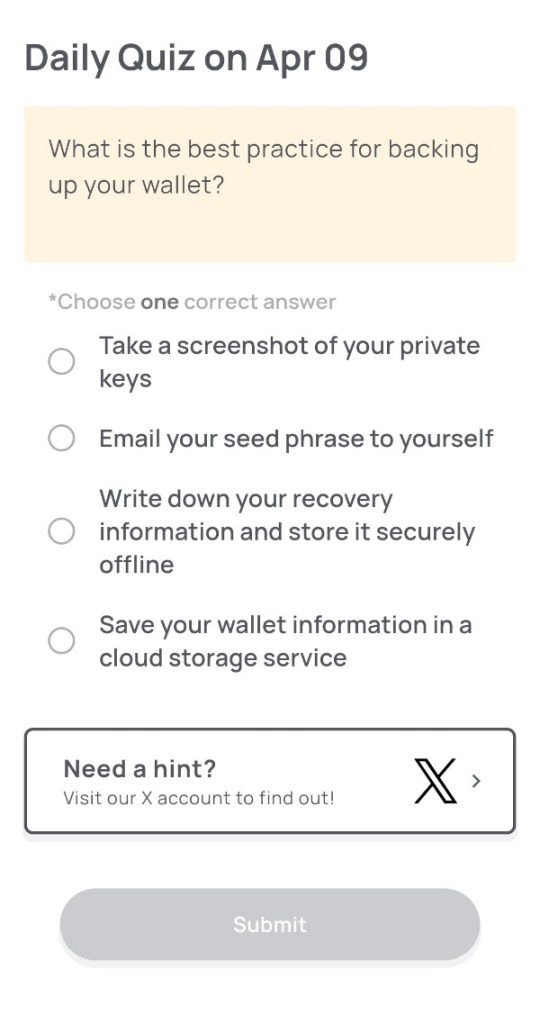
🟢Quiz Questions:
What is the best practice for backing up your wallet?
🟢Choose one correct answer:
・Take a screenshot of your private keys
・Email your seed phrase to yourself
・Write down your recovery information and store it securely offline
・Save your wallet information in a cloud storage service
🟢Answer:
Write down your recovery information and store it securely offline
🟢Reason for choosing this answer:
Writing down your recovery information (such as your seed phrase) and keeping it in a secure, offline location is the safest method to protect your crypto wallet from hacks, leaks, or loss due to device failure. Digital storage methods like screenshots, emails, or cloud services expose your sensitive data to potential cyberattacks and unauthorized access. Offline backup minimizes such risks and ensures recoverability.
🟢Trivia:
Many modern wallets, including Xenea Wallet, are starting to implement innovative technologies like secret key splitting and MPC (Multi-Party Computation) to reduce the risks associated with seed phrase storage. With this, even users who don’t manually back up seed phrases can remain protected through secure social login and patented decentralized storage methods.
Daily Quiz on APR 08
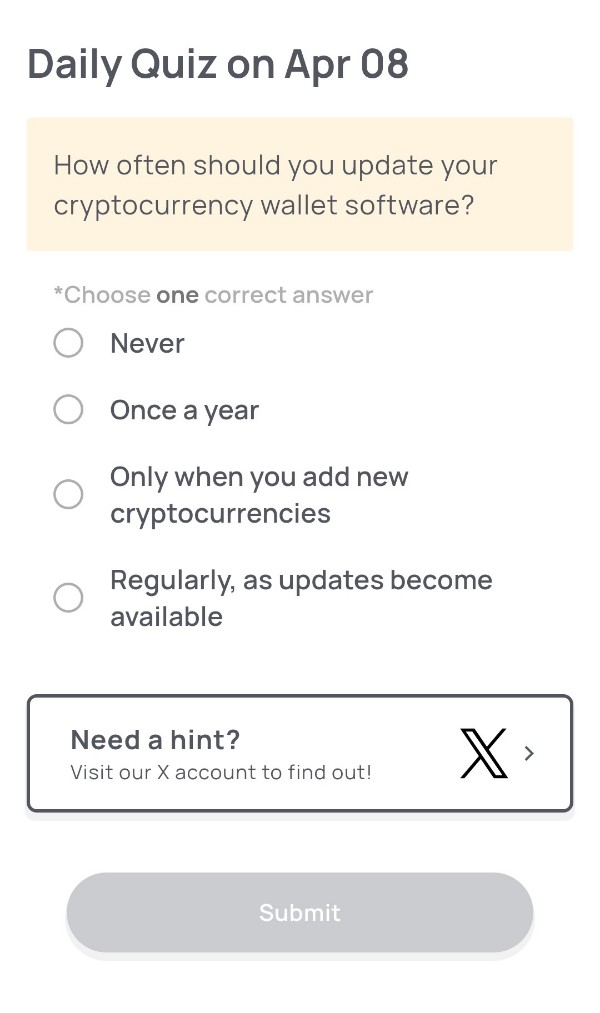
🟢Quiz Questions:
How often should you update your cryptocurrency wallet software?
🟢Choose one correct answer:
・Never
・Once a year
・Only when you add new cryptocurrencies
・Regularly, as updates become available
🟢Answer:
Regularly, as updates become available
🟢Reason for choosing this answer:
Cryptocurrency wallet software should be updated regularly to ensure that it includes the latest security patches, new features, and compatibility improvements. Developers often release updates to fix vulnerabilities or improve the user experience. Not updating could expose your wallet to potential threats or make it incompatible with newer systems.
🟢Trivia:
Many modern wallets like Xenea Wallet utilize advanced security methods such as split-key storage (as seen in their patented system) and support social login features, but even these require regular updates to maintain their security integrity and keep up with evolving blockchain standards.
Daily Quiz on APR 07
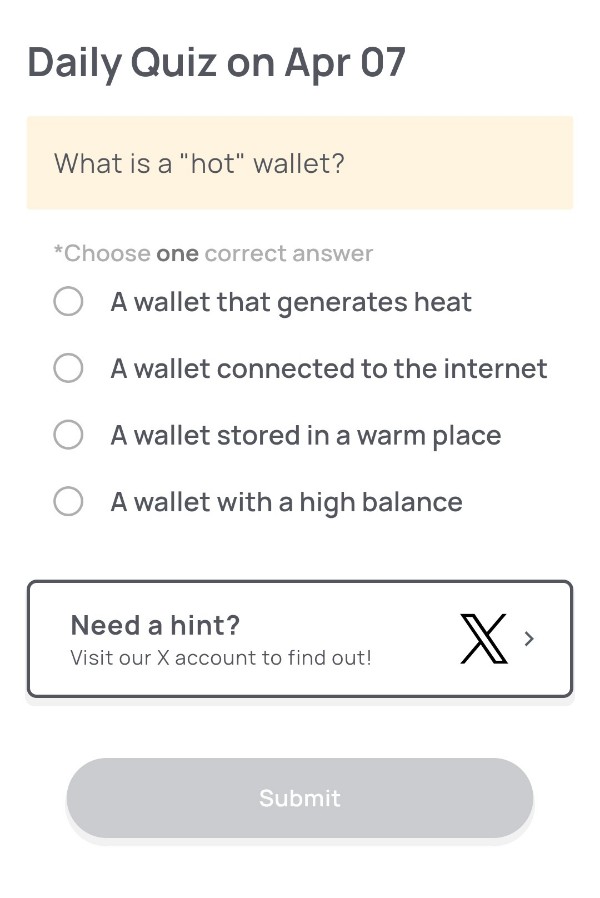
🟢Quiz Questions:
What is a “hot” wallet?
🟢Choose one correct answer:
・A wallet that generates heat
・A wallet connected to the internet
・A wallet stored in a warm place
・A wallet with a high balance
🟢Answer:
A wallet connected to the internet
🟢Reason for choosing this answer:
A “hot” wallet is a cryptocurrency wallet that is connected to the internet. It allows users to quickly access and transfer their digital assets, making it convenient for everyday transactions. However, its constant internet connection also makes it more vulnerable to hacking and security breaches compared to “cold” wallets, which are offline.
🟢Trivia:
Hot wallets include web wallets, mobile apps like Xenea Wallet, and desktop wallets. They are ideal for small, frequent transactions. For larger holdings, security-conscious users often transfer funds to cold storage solutions such as hardware wallets or paper wallets to reduce risk.
Daily Quiz on APR 06
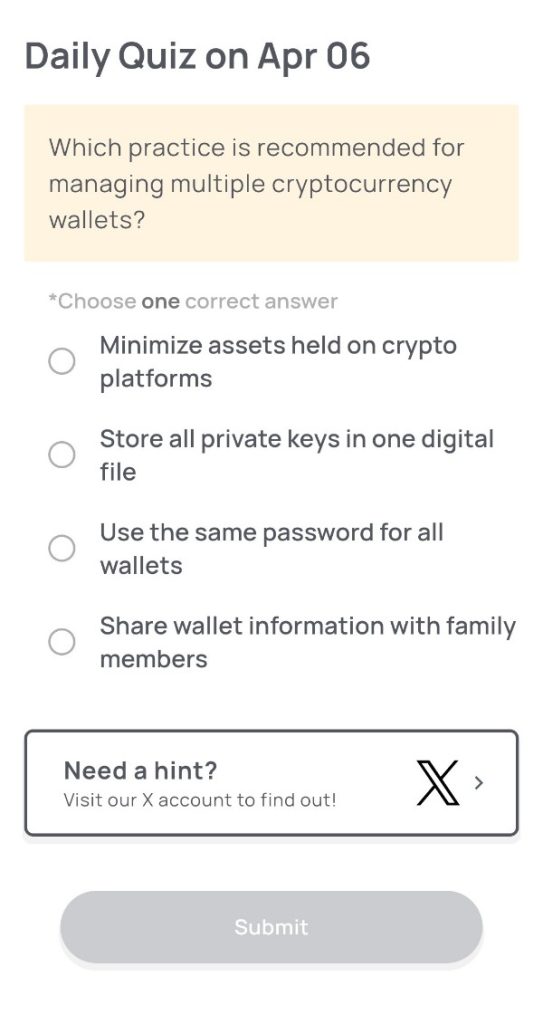
🟢Quiz Questions:
Which practice is recommended for managing multiple cryptocurrency wallets?
🟢Choose one correct answer:
・Minimize assets held on crypto platforms
・Store all private keys in one digital file
・Use the same password for all wallets
・Share wallet information with family members
🟢Answer:
Minimize assets held on crypto platforms
🟢Reason for choosing this answer:
This practice is recommended because centralized crypto platforms are frequent targets of hacking and can experience outages or even collapse (e.g., Mt. Gox, FTX). By minimizing the amount of assets stored on these platforms and using self-custody solutions like Xenea Wallet, users reduce their exposure to platform-related risks.
🟢Trivia:
A good rule in crypto is “Not your keys, not your coins.” This means if you don’t control the private keys, you don’t really own your crypto. Solutions like Xenea Wallet help users stay in control by using advanced private key management such as patented key sharding and social login recovery, removing the need for manual seed phrase storage while enhancing security.
Daily Quiz on APR 05
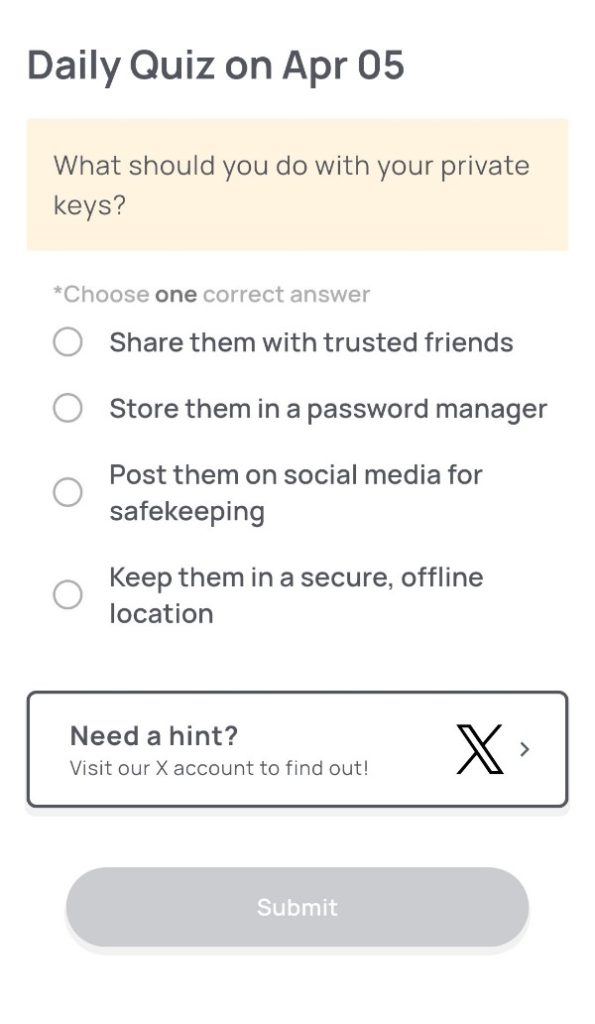
🟢Quiz Questions:
What should you do with your private keys?
🟢Choose one correct answer:
・Share them with trusted friends
・Store them in a password manager
・Post them on social media for safekeeping
・Keep them in a secure, offline location
🟢Answer:
Keep them in a secure, offline location
🟢Reason for choosing this answer:
Private keys are the most critical component in securing your crypto assets. If someone obtains your private key, they can access and transfer your funds without your permission. Keeping your keys offline (e.g., on paper, hardware wallet, or air-gapped devices) significantly reduces the risk of hacking or unauthorized access, especially compared to storing them online or sharing them with others.
🟢Trivia:
This method is known as “cold storage,” and it’s a common practice among long-term holders and institutions for securing large amounts of cryptocurrencies. Unlike “hot wallets” connected to the internet, cold storage solutions are isolated, making them far less susceptible to cyberattacks.
Daily Quiz on APR 04
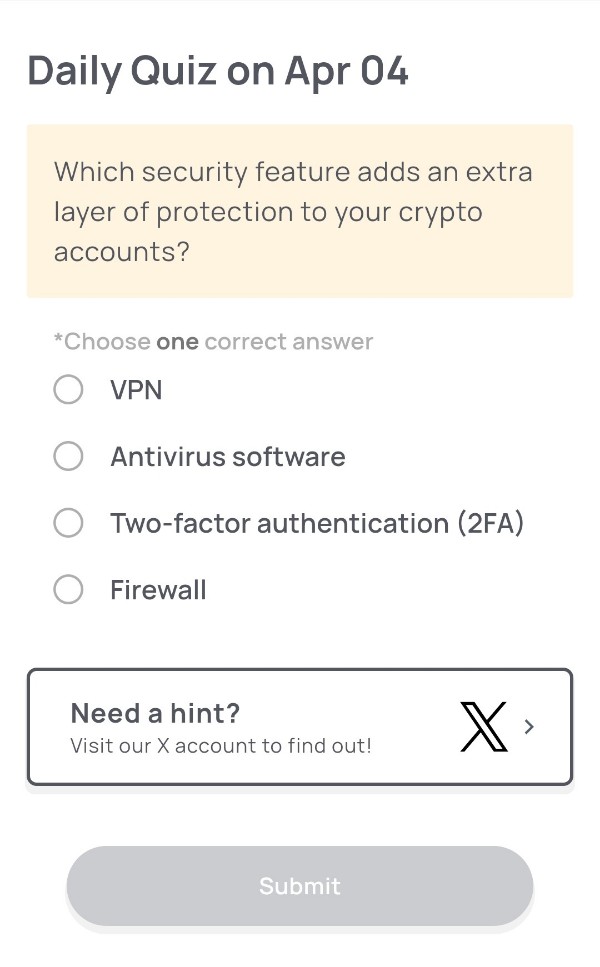
🟢Quiz Questions:
Which security feature adds an extra layer of protection to your crypto accounts?
🟢Choose one correct answer:
・VPN
・Antivirus software
・Two-factor authentication (2FA)
・Firewall
🟢Answer:
Two-factor authentication (2FA)
🟢Reason for choosing this answer:
Two-factor authentication (2FA) provides an additional security step beyond just a password, typically requiring the user to enter a temporary code sent to their phone or generated by an authentication app. This makes it significantly more difficult for unauthorized users to access your crypto accounts, even if they have your password.
🟢Trivia:
Many major crypto platforms like Binance, Coinbase, and Xenea Wallet support 2FA for added security. It’s especially important in the crypto space where unauthorized access can lead to irreversible loss of assets. Using hardware-based 2FA (e.g., YubiKey) provides an even higher level of protection than SMS-based codes.
Daily Quiz on APR 03
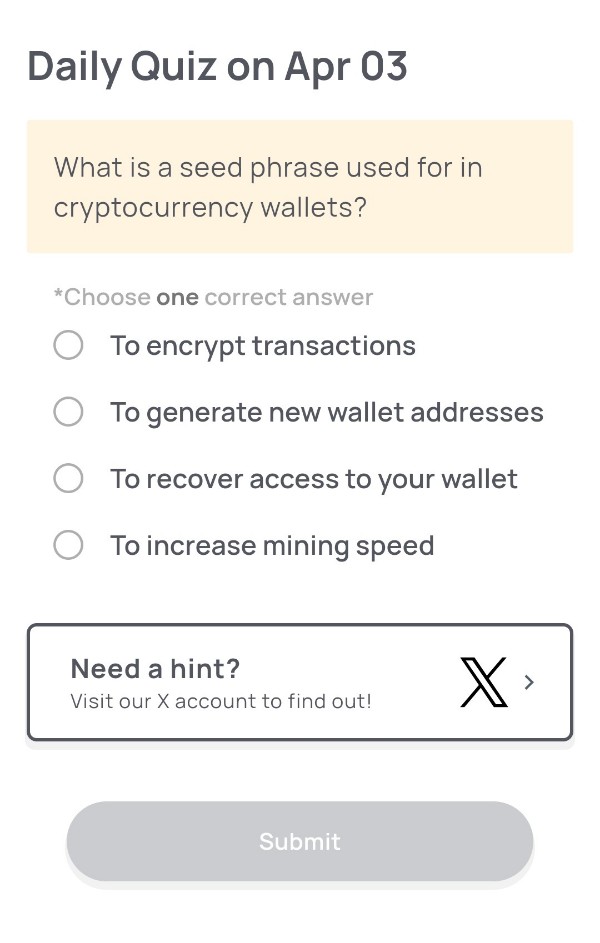
🟢Quiz Questions:
What is a seed phrase used for in cryptocurrency wallets?
🟢Choose one correct answer:
・To encrypt transactions
・To generate new wallet addresses
・To recover access to your wallet
・To increase mining speed
🟢Answer:
To recover access to your wallet
🟢Reason for choosing this answer:
A seed phrase (or recovery phrase) is a crucial security feature in most cryptocurrency wallets. It is a set of 12 to 24 words that acts as a “master key” to recover your wallet and assets if your device is lost or damaged. Without this phrase, access to your wallet and assets cannot be restored. Therefore, keeping it safe is vital.
In the case of XENEA Wallet, however, users are not required to manage a seed phrase manually. XENEA Wallet uses its patented “electronic allocation-type storage method” to split and distribute the private key across multiple anonymous nodes in a decentralized network. Wallet access and recovery are handled through secure social login (Google or Apple ID) combined with MPC (Multi-Party Computation) technology, offering a more user-friendly and safer experience.
🟢Trivia:
While traditional wallets rely on seed phrases, XENEA Wallet eliminates this risk entirely by enabling wallet recovery through a patented decentralized key management system. This innovation not only simplifies the user experience but also significantly reduces the chances of human error, like losing a recovery phrase. This is especially important for mainstream adoption of Web3 technologies.
Daily Quiz on APR 02
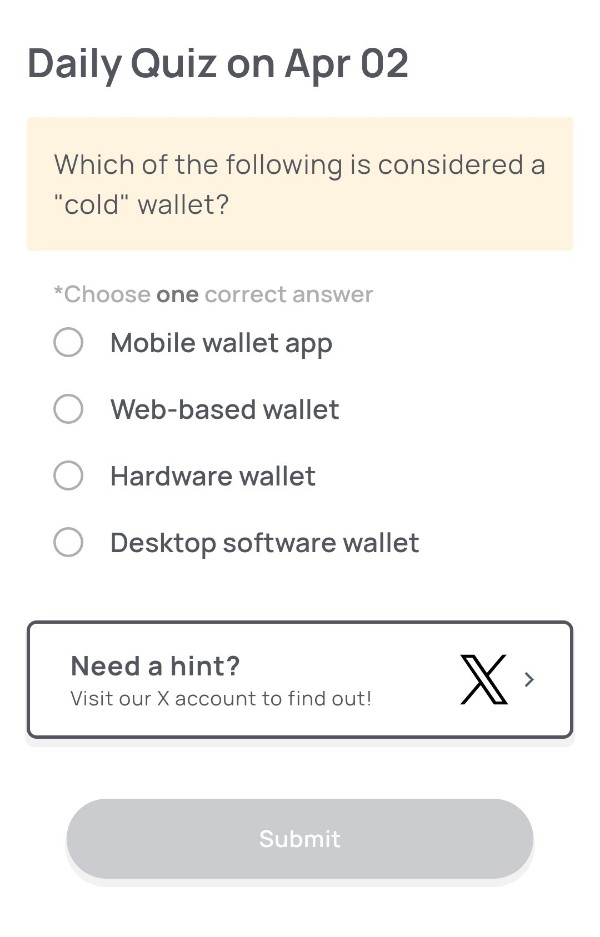
🟢Quiz Questions:
Which of the following is considered a “cold” wallet?
🟢Choose one correct answer:
・Mobile wallet app
・Web-based wallet
・Hardware wallet
・Desktop software wallet
🟢Answer:
Hardware wallet
🟢Reason for choosing this answer:
A hardware wallet is a physical device that stores your private keys offline, making it immune to online hacking attempts. Since it’s not connected to the internet when idle, it is classified as a “cold” wallet, unlike mobile, web-based, or desktop wallets which are usually connected to the internet and thus considered “hot” wallets.
🟢Trivia:
Cold wallets like hardware wallets (e.g., Ledger or Trezor) are the safest method to store large amounts of cryptocurrency for the long term. They are often used by investors and institutions who prioritize security over convenience. While hot wallets are great for quick access and transactions, cold wallets excel in long-term secure storage.
Daily Quiz on APR 01
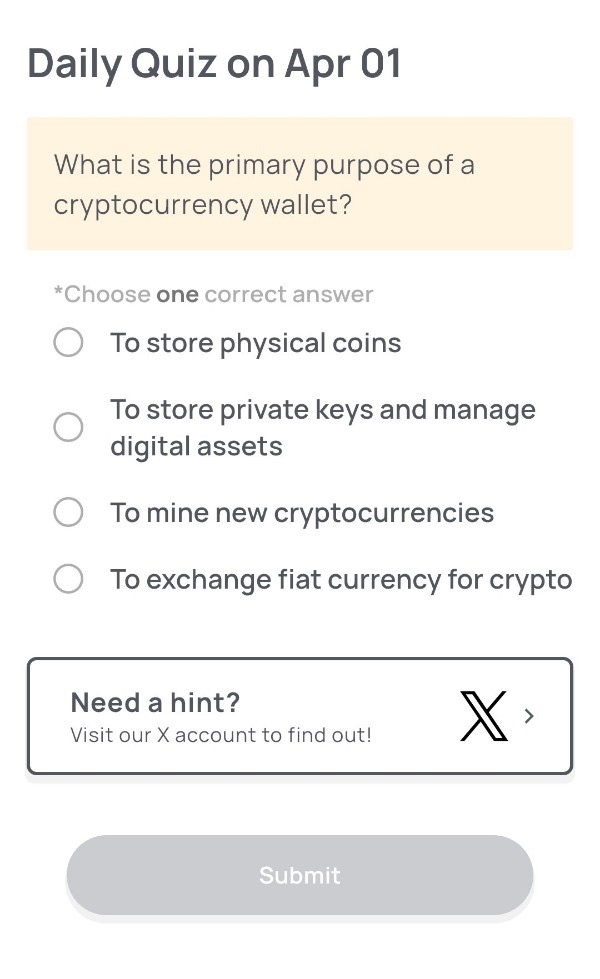
🟢Quiz Questions:
What is the primary purpose of a cryptocurrency wallet?
🟢Choose one correct answer:
・To store physical coins
・To store private keys and manage digital assets
・To mine new cryptocurrencies
・To exchange fiat currency for crypto
🟢Answer:
To store private keys and manage digital assets
🟢Reason for choosing this answer:
A cryptocurrency wallet’s main function is to store private keys securely and manage access to digital assets like cryptocurrencies or NFTs. Without the private key, you can’t access or control your digital funds. The wallet acts as a user interface to the blockchain, letting users send, receive, and monitor their digital assets.
🟢Trivia:
Most modern wallets like Xenea Wallet use advanced technologies such as key splitting and social login recovery to prevent the loss of private keys and enhance user security. Some even implement multi-party computation (MPC) or patented distributed storage techniques to eliminate the need for seed phrases entirely.

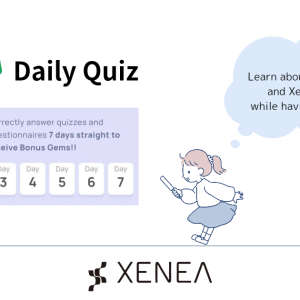
Comment